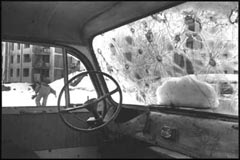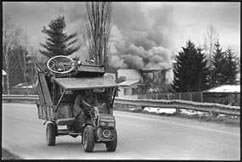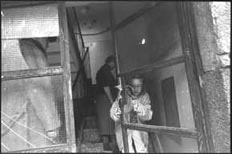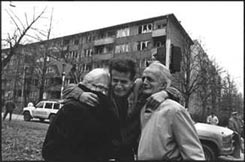At-Home with Lepa Mladjenovic
Sarajevo 1995-1996
In August of this year, I looked at an online exhibition of works by photojournalist Gilles Peress, Bosnia: Uncertain Paths to Peace.
 Sarajevo is a place of my childhood. I look at all the photos that I can find from Sarajevo during the war. I was there in the begining of 1995 while the Serbian snipers were shooting from the mountains. You had to enter the besieged city walking bent through the tunnel under the airport. And then once you get out of this dump hole you stand up and see how all the houses around are full of sniper marks, all the windows broken, balconies covered with whatever can stop the sniper bullet from entering the flat, cars upside down in order to shield the pathway, the garbage containers also, and you feel immediately that you are being watched. The snipers are everywhere on the surrounding mountains, and mountains are seen from every point in town. Your life is on display, you are possibly observed by someone who might be laughing shooting you, drinking and having a strange fun out there. You could be shot at any moment.... This went on for any citizen in Sarajevo for 44 months.
Sarajevo is a place of my childhood. I look at all the photos that I can find from Sarajevo during the war. I was there in the begining of 1995 while the Serbian snipers were shooting from the mountains. You had to enter the besieged city walking bent through the tunnel under the airport. And then once you get out of this dump hole you stand up and see how all the houses around are full of sniper marks, all the windows broken, balconies covered with whatever can stop the sniper bullet from entering the flat, cars upside down in order to shield the pathway, the garbage containers also, and you feel immediately that you are being watched. The snipers are everywhere on the surrounding mountains, and mountains are seen from every point in town. Your life is on display, you are possibly observed by someone who might be laughing shooting you, drinking and having a strange fun out there. You could be shot at any moment.... This went on for any citizen in Sarajevo for 44 months.
 I watched the photo-scenes by Peress of departure of Serbs from the suburbs of Sarajevo at the beginning of 1996. — They are very important, because it is difficult to simultaneously keep in one’s head that Serb killers have families and that they can also be victims. Serbs have been forced to leave their homes from Croatia, Bosnia and, last year, Kosovo. The scenes are so similar. I was on the road near Belgrade when peasant people arrived from Croatia in August 1995. They were on tractors and carts... some with pigs, and some with beds, fridges, mattresses, mirrors... just like the sadness of those images. People were the 14th day travelling from Croatia (200,000 were expelled in couple of days) and they did not know where they were going to. One older woman dressed in black scarf and folk skirt was resting and she said: I fear we might go the wrong way. There was practically no way for her, she was following her family and no one knew where they were going, but she thought that in that darkness of choices there is a right way and a wrong way. Another woman repeated in a calling voice that she had not unleashed her dog before leaving. The other one said she left eight feather pillows and three cows.... The people had red eyes from travelling long days and nights, from dust and no sleep. They felt they left their land forever. How many people of all nationalities were forced to leave their homes... so that we now have ethnically cleansed nation-states.
I watched the photo-scenes by Peress of departure of Serbs from the suburbs of Sarajevo at the beginning of 1996. — They are very important, because it is difficult to simultaneously keep in one’s head that Serb killers have families and that they can also be victims. Serbs have been forced to leave their homes from Croatia, Bosnia and, last year, Kosovo. The scenes are so similar. I was on the road near Belgrade when peasant people arrived from Croatia in August 1995. They were on tractors and carts... some with pigs, and some with beds, fridges, mattresses, mirrors... just like the sadness of those images. People were the 14th day travelling from Croatia (200,000 were expelled in couple of days) and they did not know where they were going to. One older woman dressed in black scarf and folk skirt was resting and she said: I fear we might go the wrong way. There was practically no way for her, she was following her family and no one knew where they were going, but she thought that in that darkness of choices there is a right way and a wrong way. Another woman repeated in a calling voice that she had not unleashed her dog before leaving. The other one said she left eight feather pillows and three cows.... The people had red eyes from travelling long days and nights, from dust and no sleep. They felt they left their land forever. How many people of all nationalities were forced to leave their homes... so that we now have ethnically cleansed nation-states.
 These pictures of Peress are good because you have one situation that people suffer leaving homes, and on the other hand some of them are killers. And second, you have one man who, on this road out of his home forever, meets his very good friend from their school days. One Muslim and one Serb friend met and talked and embraced and touched for hours—they were soldiers of two opposed sides! It all stands where it is, a crime remains a crime and a wound remains a wound, suffering and pain as well. And all these different categories of ethics can be embedded in one person as much as in one nation.
These pictures of Peress are good because you have one situation that people suffer leaving homes, and on the other hand some of them are killers. And second, you have one man who, on this road out of his home forever, meets his very good friend from their school days. One Muslim and one Serb friend met and talked and embraced and touched for hours—they were soldiers of two opposed sides! It all stands where it is, a crime remains a crime and a wound remains a wound, suffering and pain as well. And all these different categories of ethics can be embedded in one person as much as in one nation.
 In Sarajevo during those days of war, it was not easy to walk down the streets knowing you’d come from Belgrade — from where the shooting was ordered. In one “burek-shop” (selling Bosnian pita) I was with a friend and she wanted to pay for both of us, and I said no I will pay and she said no you are from Belgrade, you are my guest...., and then the owner, a Muslim man, heard this conversation, he was thin, with an exhausted face and with eyes looking far away, he interrupted us and said, if she comes from Belgrade to visit us now under snipers, she is my guest.
In Sarajevo during those days of war, it was not easy to walk down the streets knowing you’d come from Belgrade — from where the shooting was ordered. In one “burek-shop” (selling Bosnian pita) I was with a friend and she wanted to pay for both of us, and I said no I will pay and she said no you are from Belgrade, you are my guest...., and then the owner, a Muslim man, heard this conversation, he was thin, with an exhausted face and with eyes looking far away, he interrupted us and said, if she comes from Belgrade to visit us now under snipers, she is my guest.
I believe there are beautiful people in war, and that these acts of solidarity are paths to the postwar civil society.



